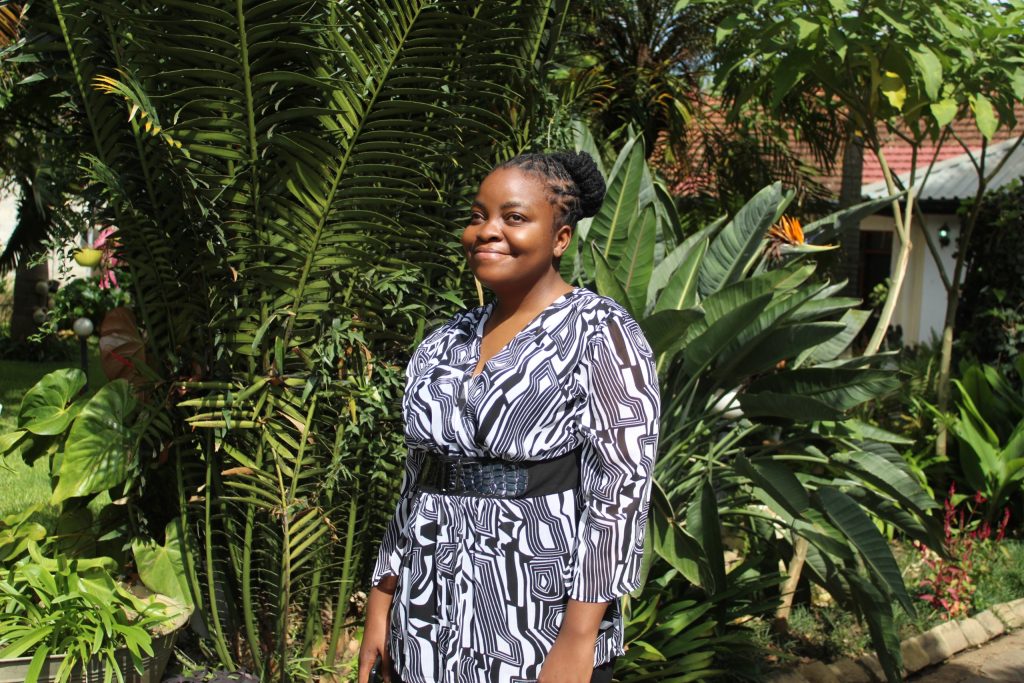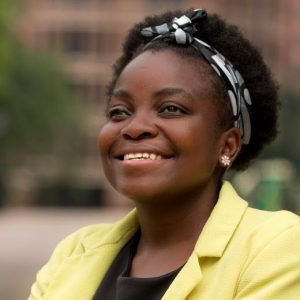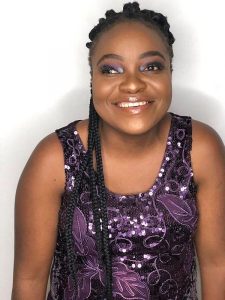Meet Nsofwa: an inspirational youth leader from Zambia
 03 February 2023
03 February 2023

Nsofwa (30) lost her father when she was a toddler. After her mother also passed away when she was only 10 years old, Nsofwa came to know that she contracted HIV at birth. When she was 17 she got meningitis. Due to poor adherence to Anti-Retroviral Therapy (ART) she lost her sight and got deaf on her right ear. Nevertheless, she finished tertiary level education.
The biggest challenge for Nsofwa was to adapt to the situation of having a disability and living with HIV. Her strong family support system provided her with the courage to accept her situation and to become an independent young woman with disability, living with HIV.
You had an incredible difficult childhood, yet you are helping other youths with disabilities living with HIV. What enabled you to achieve that?
 After obtaining my diploma as clinical and psychological counsellor, I discovered that nothing was being done for persons with disabilities living with HIV in Zambia. I started to reach out to fellow youths with disability and HIV, initially to share our challenges of having adisability and having to take daily medications at the same time. In 2017 I was selected to join the Mandela Fellowship on promoting civic leadership in Africa, which led me to start an initiative called Positive Movement Zambia. Positive stands for having a positive mind and attitude towards others. I run this organization to date, and the aim is to create an inclusive society for all. We work with young people, some who are living with HIV, others who aren’t, and we engage with policy makers about initiatives to support youths with disabilities living with HIV.
After obtaining my diploma as clinical and psychological counsellor, I discovered that nothing was being done for persons with disabilities living with HIV in Zambia. I started to reach out to fellow youths with disability and HIV, initially to share our challenges of having adisability and having to take daily medications at the same time. In 2017 I was selected to join the Mandela Fellowship on promoting civic leadership in Africa, which led me to start an initiative called Positive Movement Zambia. Positive stands for having a positive mind and attitude towards others. I run this organization to date, and the aim is to create an inclusive society for all. We work with young people, some who are living with HIV, others who aren’t, and we engage with policy makers about initiatives to support youths with disabilities living with HIV.
I have seen both the sighted and the blind world. I saw opportunities when I could see; opportunities that I missed after becoming blind. Now through the Make Way program, we have support groups for young people with disabilities, coming together and talking about their experiences and challenges.
What do you see as challenges for young people in your community?
Lack of emotional support is perhaps the largest challenge; young people like me try to accept and adjust to the reality that we are living with a virus and have a disability. Young people fail to open up and accept their situation, because they lack the trust and support to share about this. Also, the lack of information on Sexual and Reproductive Health issues is causing young people to be ignorant about contraceptives, they don’t know the difference between HIV and AIDS and Sexually Transmitted Infections (STIs). Some young people with disability need a lot of care, but they lack the support from their parents or guardians. These young people are left out of youth-friendly spaces where others can access SRH information and services; access to such spaces, but also the attitude of some health providers hinders young people to obtain the services they need.
So now you are part of the Make Way program; what is your impression?
I joined the Make Way program two years ago and it has made me realize that there is a gap; young people with disabilities do not access health care, especially SRH services and information, like other people. It has been insightful to learn about how to address issues of persons with disabilities at the level of health facilities and hospitals. It motivates me to hear about different stories, it pushes me to do better, especially when that person is in a worse situation than me. I would encourage more young people to come through, because in the safe spaces we share our experiences, we laugh, we encourage each other to speak about issues affecting us, and we share knowledge on sexual and reproductive health rights and services. This is also the platform we use to advocate for accessible, quality health care.
With the arrival of the Make Way program we have seen inclusion of youth with disabilities in meetings, in youth friendly committees and in safe spaces, making it possible for youth with disabilities to access SRH services.
What is the Regional Youth With Disabilities Council bringing you?
The Regional Council is one of the platforms of the Make Way program where young people have conversations about the different challenges we are facing. I represent my country Zambia on the regional Council, and I learn a lot from the experiences from the other four countries, and I get ideas on how to replicate good examples in my country. We meet once a month and we discuss our challenges and we select objectives to focus on. All young people represented in the council shared about the lack of information on sexual and reproductive health in their country, and we realized that we are all fighting for the same goal. As a first activity, we all took part in the 16 Days of Activism Against Gender Based Violence, and it was exciting to see different young people with different disabilities taking part in the International Day of Persons with Disabilities (3 December). I joined Cheshire Home Society of Zambia in their activities and it was very inspiring.
Do you have a message for young people with disabilities in Zambia and beyond?
 Never to give up! Giving up should be the last option. We all go through challenges, some of us find it on our way, others are born with it, and it is not the end of the world. Fight until the last bone, it’s what I say to myself each day.
Never to give up! Giving up should be the last option. We all go through challenges, some of us find it on our way, others are born with it, and it is not the end of the world. Fight until the last bone, it’s what I say to myself each day.



